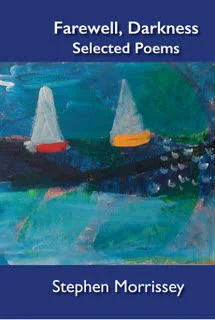Preface
—John Milton
|
T |
his selection of poems is taken from books and chapbooks I published from 1971 to 2021. When I began writing poetry my themes were the transience of life, family, grief at losing close family members, and romantic love. These many years later I am still writing about the transience of life, family, grief at losing close family members, and romantic love, but giving more emphasis to some and less to others. My experience is that where we begin as poets is where we end. What is our journey as poets? It is the great theme of literature; it is the journey to self-awareness.
1
These poems are presented here without section breaks; this is the model Ken Norris suggested to me, found in Robert Creeley's Selected Poems (1991). The text of Creeley's book has a continuity that is unbroken by titles of books and dates published, as one finds in most selected poems, and I've used the same approach in presenting the poems in this book; it is the book of poems of my life. Of course, bibliographical information is still available in both the Books Published page and the Contents page.
We learn something from every poet we read. In 1967 I read Allen Ginsberg's statement, "Scribble down your nakedness. Be prepared to stand naked because most often it is this nakedness of the soul that the reader finds most interesting"; it was an important insight for me and has influenced my writing to this day. But other poets were also important; these include William Blake; the Romantic poets; Walt Whitman; the Beats; Charles Olson; Louis Dudek; and George Johnston.
3
Poetry isn't antiseptic, it's passion for life. Poetry is love and death and tears of joy and tears of sorrow. It's messy, it's stuff we don't want to talk about, it's betrayal and jealousy, it's love and sex and tenderness and grief and regret and awe and divine inspiration; it's the shadow falling across one's life. Poetry is nothing if not passionate; passion, not the intellect, not fashion, not popularity, not what other people are doing, defines poetry.
4
We all experience darkness in our lives: some of us have descended to the underworld; some have been lost in a dark forest; and some of us have had to begin life again in middle age—we lost everything—for nothing was as we believed. But darkness can be place of creativity, of self-awareness, of meaning, and of rebirth. I found my voice in poetry when I was able to turn the darkness of my life experiences into poems; I affirmed what I had seen and I said, "thank you, darkness" and "farewell, darkness"; and that is the birth of the poet.
5
My wife, the poet Carolyn Zonailo, is always in my thoughts and heart; to her my thanks, my love, and my deepest appreciation for our over thirty years together. I want to thank Richard Olafson for his commitment to publishing—the year 2022 was Ekstasis Editions' fortieth anniversary—he has made an important contribution to our national literary life; he has helped many creative people realize their potential and their dream.
Stephen Morrissey
Montreal, Quebec
20
November 2022

.jpg)
